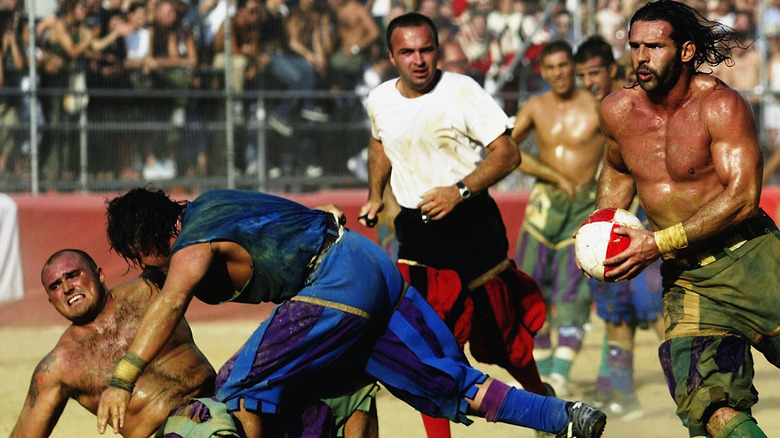Why This Game Was Banned During Medieval Times
Over the centuries, there have been sports that were very harsh. The Mayans had a version of basketball in which, at times, the losers were sacrificed, per National Geographic. There were brutal gladiatorial fights in Ancient Rome (per History Today). In today's society, there are boxing, wrestling, and mixed martial arts, all of which serve at some level to attempt to satiate the bloodthirsty nature of crowds. The participants often attempt to inflict as much pain as possible on their opponents, and injuries are a workplace hazard. There is even a gambling element, sanctioned all over the country.
Back in medieval times, though, there was a time when the ruling class put the clamps on playing a particular type of game. There was a very good reason why this sport, which was a very early version of soccer, was banned: It was brutal for all involved and it caused too much damage. This game, which was a precursor of sorts to soccer, was merely called "ball" and was first recorded in Britain in 1170.
The distances run in this game made a soccer field look small
According to Bleacher Report, these games were often played in medieval villages as a way to settle disputes or even as part of a pagan ritual (via Britannica). Unfortunately, many things tended to get broken in the course of the game — people's properties, their skin and bones. This was not a genteel sport played by British aristocrats. The participants also carried weapons, and there were incidents, perhaps accidental. Sometimes those accidents were fatal.
The games got way out of hand. Imagine a soccer game that was held on a "field" that was a couple of miles long. Add the fact that it was permissible to deliver punches and kicks to opponents, and it could get very bloody very quickly. There was also a very strong chance of property damage occurring. King Edward II had enough and banned it in 1314. The reason he cited, though, was that it was distracting his soldiers, and he'd rather they were practicing their archery, which was important to the national interests. His son, King Edward III, upheld the ban in 1331 for the same reasons. Later on, yet another King Edward, this one King Edward IV, banned it in 1477.
People rebelled against the bans, saying that playing the game helped keep them healthy. The game kept getting more popular. Eventually, the game evolved into the version of soccer that we see today, though (thankfully) without any weapons or punches.

